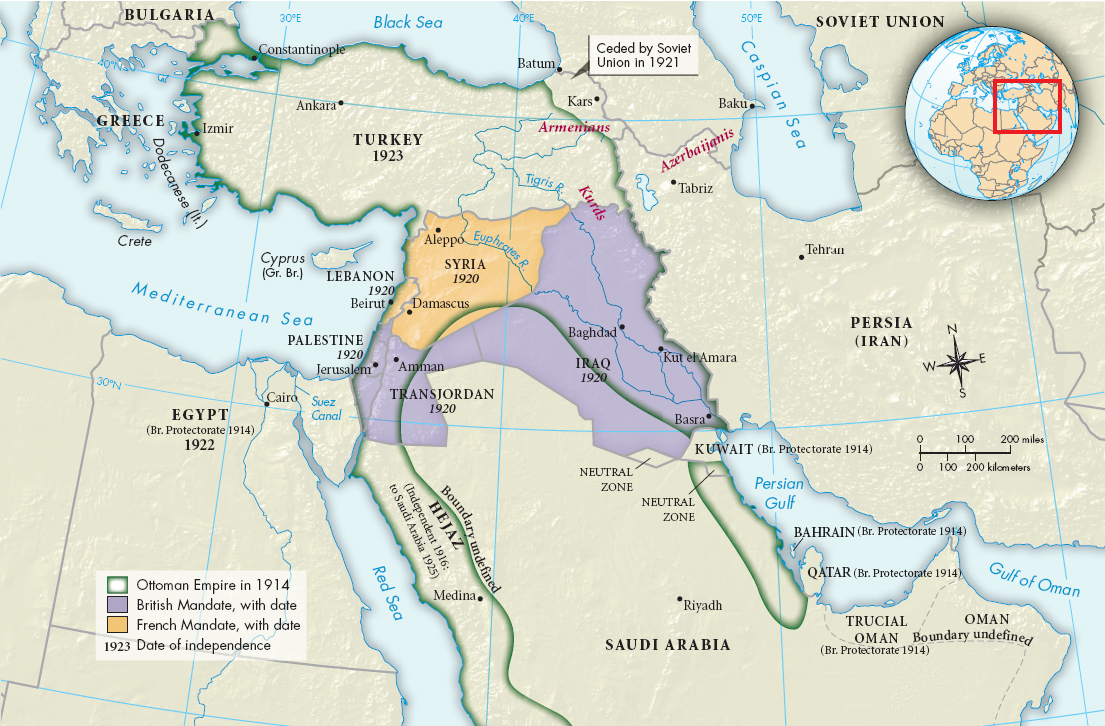Understanding Western Society
Printed Page 801
Chapter Chronology
The Peace Settlement in the Middle East
The British government had encouraged the wartime Arab revolt against the Ottoman Turks and had even made vague promises of an independent Arab kingdom. However, when the fighting stopped, the British and the French chose instead to honor their own secret wartime agreements to divide and rule the Ottoman lands. Most important was the Sykes-Picot Agreement of 1916. In the secret accord, Britain and France agreed that former Ottoman territories would be administered by the European powers under what was later termed the mandate system. France would receive a mandate to govern modern-day Lebanon and Syria and much of southern Turkey, and Britain would control Palestine (including territories that would become the modern state of Israel in 1948), Transjordan, and Iraq. When Britain and France set about implementing their agreements after the armistice, Arab nationalists reacted with understandable surprise and resentment.
British plans for the former Ottoman lands that would become Palestine further angered Arab nationalists. The Balfour Declaration of November 1917 announced that Britain favored a “National Home for the Jewish People” in Palestine. The declaration enraged Arabs.
In 1914, Jews accounted for about 11 percent of the population in the three Ottoman districts that would form Palestine; the rest of the population was predominantly Arab. Both groups understood that the Balfour Declaration’s National Home for the Jewish People implied the establishment of some kind of Jewish state that would violate majority rule.
Though Arab leaders attended the Versailles Peace Conference, their efforts to secure autonomy in the Middle East came to nothing. Only the kingdom of Hejaz was granted independence (Map 25.5). In response, Arab nationalists came together in Damascus as the General Syrian Congress in 1919 and unsuccessfully called again for political independence.
The Western reaction was swift and decisive. The French attacked Syria, taking Damascus in July 1920. Meanwhile, the British put down an uprising in Iraq and established control there. Brushing aside Arab opposition, the British in Palestine formally incorporated the Balfour Declaration and its commitment to a Jewish national home.
The Allies sought to impose even harsher terms on the defeated Turks than on the “liberated” Arabs. A treaty forced on the Ottoman sultan dismembered the Turkish heartland. Great Britain and France occupied parts of modern-day Turkey, and Italy and Greece claimed shares. There was a sizable Greek minority in western Turkey, and Greek nationalists wanted to build a modern Greek empire. In 1919, Greek armies carried by British ships landed on the Turkish coast at Smyrna (SMUHR-nuh) and advanced unopposed into the interior, while French troops moved in from the south. Turkey seemed finished.
Turkey survived the postwar invasions. Led by Mustafa Kemal (1881–1938), the Turks gradually mounted a successful resistance. The Greeks and British sued for peace. Signed in 1923, the Treaty of Lausanne (loh-ZAN) recognized the territorial integrity of Turkey and abolished the capitulations that the European powers had imposed over the centuries to give their citizens special privileges in the Ottoman Empire.
Kemal believed that Turkey should modernize and secularize along Western lines. He established a republic, was elected president, and created a one-party political system. His most radical reforms pertained to religion and culture. Profoundly influenced by the example of western Europe, Kemal set out to limit the place of religion and religious leaders in daily affairs. He decreed a separation of church and state, promulgated law codes inspired by European models, and established a secular public school system. Women received rights that they never had before. By the time of his death in 1938, Kemal had implemented much of his revolutionary program and moved Turkey much closer to Europe.

MAP 25.5
The Partition of the Ottoman Empire, 1914–1923By 1914, the Ottoman Turks had been pushed out of the Balkans, and their Arab provinces were on the edge of revolt. That revolt, in alliance with the British, erupted during the First World War and contributed greatly to the Ottoman defeat. Refusing to grant independence to the Arabs, the Allies established League of Nations mandates and replaced Ottoman rulers in Syria, Iraq, Transjordan, and Palestine.
